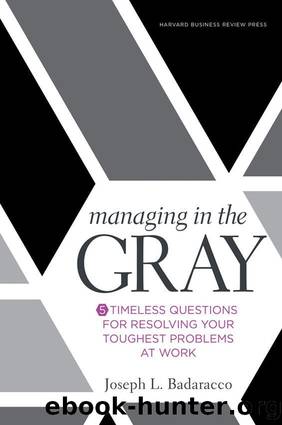Managing in the Gray: Five Timeless Questions for Resolving Your Toughest Problems at Work by Joseph L. Badaracco Jr

Author:Joseph L. Badaracco Jr. [Badaracco Jr., Joseph L.]
Language: eng
Format: epub
ISBN: 9781633691759
Publisher: Harvard Business Review Press
Published: 2016-08-15T22:00:00+00:00
The Network of Mutuality
If managers ignore their constitutive relationships when they face hard decisions, they are not only rejecting parts of themselves. They are also rejecting a long-standing perspective on our common human experience. Over the centuries, the idea that human nature is profoundly social has taken many different forms. The sacred Hindu text, the Upanishads, explains this perspective with a simple metaphor. It says, “As all the spokes are fastened to the hub and the rim of a wheel, so to one’s self are fastened all beings, all the gods, all the worlds, all the breaths, and all these bodies.”8 In the West, Aristotle’s succinct and famous statement of this perspective was his definition of human beings as political or social animals.9
During the Middle Ages, the Western tradition transformed this idea into a worldview called “the great chain of being.” It said the universe was organized like a vast corporate organization chart. God presided over ranks of angels. Below them, on earth, were kings, then other royalty, then other strata of society. Further down, in the underworld, there was Satan who presided over the ranks of fallen angels. This way of thinking—the view that all life or all humanity and perhaps all of reality is deeply one—began to recede during the Renaissance and, for many people, the emergence of modern science made it to a charming metaphor rather than a description of reality.
And yet the idea of some vast, encompassing “we” remains powerful, and we often hear variations on this theme. Martin Luther King Jr., for example, composed a beautiful, lyrical version of the idea. In his Letter from Birmingham Jail, King wrote, “We are caught in an inescapable network of mutuality, tied in a single garment of destiny.”10 Most religions today accept some version of the idea King expressed, and so do atheists.11 Albert Einstein, for example, wrote, “It seems to me that the idea of a personal God is an anthropological concept which I cannot take seriously . . . Science has been charged with undermining morality, but the charge is unjust. A man’s ethical behavior should be based effectually on sympathy, education, and social ties and needs; no religious basis is necessary.”12
In fact, a scientific perspective can reinforce the idea of deep human bonds. Evolutionary theory treats human beings as just another of the species that originated when a lightning bolt or a lava flow heated a pool of carbon-based muck and somehow produced molecules that replicated, survived, and evolved. Yet even from this perspective, the notion of deep psychological and emotional bonds—largely unconscious, pervasive and powerful—remains plausible.
We have already noted that our ancient ancestors were the creatures that were more sensitive to relationships and more inclined to collaborate and hence had a better chance of surviving and passing along their genes.13 But evidence of many kinds suggests we are profoundly social beings. For example, anthropologists and others have studied the occasional reports of so-called feral children—who were raised by bears or other animals and, for years, had no human contact.
Download
This site does not store any files on its server. We only index and link to content provided by other sites. Please contact the content providers to delete copyright contents if any and email us, we'll remove relevant links or contents immediately.
Time Management Made Easy: How to Cultivate New Habits, Improve Productivity and Get Things Done by Joshua Strachan(2418)
The 7 Habits of Highly Effective People by Stephen R. Covey & Sean Covey(2267)
The Concise Laws of Human Nature by Robert Greene(1914)
Doesn't Hurt to Ask by Trey Gowdy(1638)
Primal Leadership by Daniel Goleman(1283)
Hook Point: How to Stand Out in a 3-Second World by Brendan Kane(1246)
Don't Sweat the Small Stuff...and It's All Small Stuff by Richard Carlson(1121)
HBR's 10 Must Reads 2021 by unknow(1097)
The Power of 100! by Shaun King(1097)
Amazon Unbound by Brad Stone(1045)
100 Things Successful People Do by Nigel Cumberland(1030)
Master of One by Jordan Raynor(1008)
HBR's 10 Must Reads 2021 by Harvard Business Review(1007)
The Job Closer by Steve Dalton(994)
Lives of the Stoics by Ryan Holiday & Stephen Hanselman(969)
Declutter Your Mind: A step by step guide to learn to control your thoughts, stop worrying, relieve anxiety and eliminate panic attacks and negative thinking by Mia Chandler(968)
Conflicted by Ian Leslie(872)
The Book of Hope by Jane Goodall(872)
Coders at Work: Reflections on the craft of programming by Peter Seibel(848)
